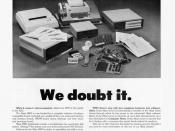Summary of 'Amateur Hour'
Chapter Four of Accidental Empires, Robert X Cringely
In the early 1970's Personal Computer Software wasn't possible because there wasn't any hardware available on which it could be used. What made this possible was the appearance of the MITS Altair 8800 computer, which in turn was made possible thanks to Intel's invention of the microprocessor. It wasn't until then, in 1974, that Bill Gates was able to convert from minicomputers to microcomputers. This is more or less the foundation for Chapter Four of Accidental Empires by Robert Cringely, titled Amateur Hour. It is based on how hardware nearly always makes possible software. In this essay I will summarise the chapter and also make it clear to see how some of the people who started it all off, did so more or less by accident, just by being in the right place at the right time.
Bill Gates, being a businessman, wanted to set the de facto standard by developing the fist high-level language for the first personal computer.
He knew that the first language would become the de facto standard, the one which everyone follows, for the whole industry. Once they had discovered that MITS was going to release the first microcomputer called Altair 8800, Paul Allen and Bill Gates wrote a version of the BASIC programming language on a PDP-10 minicomputer, which simulated the Altair's 8080 microprocessor. It was then demonstrated to Ed Roberts, the founder of MITS, it worked and came to be called MITS BASIC.
Gates and Allen also wrote versions of BASIC for other microcomputers as they came to the market. After some time, Ed Roberts was claiming that he owned MITS BASIC and its derivatives. This led to a court case that Gates and Allen won and it caused a fall-out...



Very Provocative.
Provided a firm paper. Good use of a pursuasive language. I think this paper was very well explained and put together with great ambition. This paper is very informative and understandable. A confident, self-assured paper.
Well Done!
11 out of 11 people found this comment useful.